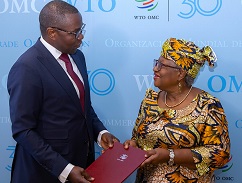By Africa Risk Control,NBE
Copyright newbusinessethiopia

By Africa Risk Control East Africa Desk – Agriculture remains the backbone of Kenya’s economy, contributing nearly 22% of GDP directly and another 27% indirectly through linkages with manufacturing, transport, and trade.
The sector employs more than 60% of the rural population and plays a critical role in food security, export earnings, and industrial raw materials. With a fast-growing population, rising urban demand, and regional trade opportunities under the African Continental Free Trade Area (AfCFTA), Kenya’s agriculture is poised for transformation. However, structural inefficiencies, climate change, and policy gaps remain pressing risks that investors must navigate carefully.
Key Investment Opportunities
Horticulture and Floriculture – Kenya is already the largest exporter of cut flowers to the European Union. Demand for avocados, mangoes, berries, and herbs is increasing in the Middle East, China, and Europe. Opportunities lie in modern packhouses, cold storage, and logistics solutions.
Agri-processing and Value Addition – Less than 20% of Kenya’s agricultural output is processed locally. Investment in processing tea, coffee, dairy, edible oils, and cereals can capture higher margins while reducing post-harvest losses.
Irrigation and Climate-Smart Farming – Only about 3% of arable land is irrigated. Technologies such as drip irrigation, solar-powered pumps, and precision farming offer scalable solutions to mitigate rainfall dependency.
Livestock and Dairy Development – Kenya is East Africa’s leader in dairy, yet productivity remains below global averages. Investment opportunities exist in modern breeding, feed production, cold chain infrastructure, and dairy processing.
Digital Agriculture and Fintech – Mobile penetration above 90% makes Kenya a leader in agritech. Startups linking farmers to markets, offering crop insurance, and digital payments present scalable investment opportunities.
Renewable Energy for Farming – Off-grid solar for irrigation, drying, and cold storage is gaining traction as sustainable and cost-effective solutions.
Major Players in Key Sectors
Horticulture & Floriculture – Kenya Flower Council (KFC), Oserian Development Company, Finlays Kenya.
Tea & Coffee – Kenya Tea Development Agency (KTDA), East African Tea Trade Association, Dormans Coffee.
Dairy – Brookside Dairy (owned partly by Danone), New KCC, Meru Dairy Cooperative Union.
Agri-finance & Agritech – Twiga Foods, DigiFarm by Safaricom, M-Farm.
Government & Development Partners – Kenya Agricultural and Livestock Research Organization (KALRO), USAID’s Feed the Future, World Bank projects.
Risks & Challenges
Climate Change – Droughts and unpredictable rainfall continue to disrupt production cycles.
Land Tenure Issues – Complex land ownership and fragmentation hinder large-scale farming.
Infrastructure Gaps – Poor rural roads and insufficient cold chain systems increase post-harvest losses (estimated at 30–40%).
Policy Uncertainty – Frequent shifts in export levies, subsidies, and trade restrictions affect investor confidence.
Financing Constraints – High interest rates and limited agricultural credit keep many smallholders undercapitalized.
Pest and Disease Outbreaks – From locust invasions to crop and livestock diseases, biosecurity remains a key vulnerability.
Risk Mitigation Strategies
– Climate-smart practices such as irrigation, drought-resistant seed varieties, and early-warning systems.
– Public-private partnerships (PPPs) in infrastructure to improve storage, processing, and logistics.
– Policy engagement with government agencies to anticipate and adapt to regulatory changes.
– Insurance and digital finance tools to reduce smallholder risk and improve access to credit.
– Partnership with cooperatives and producer organizations to ensure reliable supply chains.
In summary, Kenya’s agriculture sector remains a pillar of the economy and a gateway to regional food security. While risks are real, they are increasingly being addressed through innovation, digitalization, and policy reforms. For investors willing to combine capital with technical expertise and risk-management strategies, the sector offers robust opportunities—from high-value exports to domestic processing and agritech solutions. With the right approach, Kenya’s agriculture can deliver both financial returns and developmental impact.
EDITOR’S NOTE: Engaged in due diligence and risk advisory service provision in 32 plus African countries, Africa Risk Control, is business affiliate of New Business Ethiopia.



